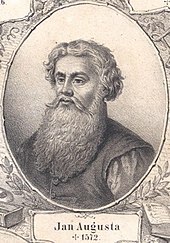Jan Augusta
Jan Augusta (also Johannes Augusta ; * around 1500 in Prague ; † January 13, 1572 in Jungbunzlau ) was bishop of the Unity of the Bohemian Brothers and author of theological writings.
Life
Jan Augusta came from an utraquist Prague family and learned the trade of hat maker. At the age of 24 he joined the Unity of the Bohemian Brothers, where he is said to have received theological instruction from the Brethren Bishop Lukas of Prague . In 1531 he was ordained a priest and installed in Benatek . Just one year later he was elected bishop ( senior ) at the Synod of Brandeis , with Leitomischl as his seat . At that time, the town and the lordship of Leitomischl belonged to the Bohemian nobleman Bohuslav Kostka von Postupitz , who was a supporter of the Bohemian brothers and supported them.
Although Jan Augusta is said in some sources that he had an inadequate scientific education, he published the 47-page German book Rechenschaffe des Glaubens, der Dienst und Ceremonies of the Brothers in Behmen and Mehrern as early as 1532 in the Zurich publishing house Froschouer
Also in 1532 he was elected Bishop of the Brotherhood. Together with fellow bishop Johann Horn , who was elected to succeed Lukas von Prag, who died in 1529 and who was appointed judge at the Synod of Brandeis in 1532, Jan Augusta campaigned for the connection to the German Reformation . Also with Johann Horn, he wrote an amended Confessio in 1535 , which summarized the teaching of the Brethren in twenty articles. After King Ferdinand I refused to consent to this Confessio , the Brothers' Union intensified its contacts with the Reformation centers in Wittenberg and Strasbourg , which resulted in an ideological opening to Lutheran theology.
In this context, Augusta's visit to Martin Luther in Wittenberg in 1542 should be mentioned. The preacher Georg Israel , Joachim Prostibor and others also belonged to the embassy . This visit was apparently the last in a row. Luther said goodbye to numerous professors at the University of Wittenberg , the words of the reformer have been handed down as follows: "Are you the apostles of the Slavic tribe: I, with my family, want to be the apostle of the German tribe."
In 1547 Jan Augusta succeeded the deceased co-bishop Johann Horn as judge of the brother union. A year later, after the class uprising of 1547 was put down, the brotherhood was largely destroyed. She therefore moved her line to Moravia, where the brothers were less persecuted. On April 25, 1548 Jan Augusta and his helper Jakub Bílek were arrested, tortured and brought to Prague. They were then imprisoned in Křivoklát Castle for sixteen years. Nevertheless, Jan Augusta tried to continue running the brotherhood from his imprisonment. However, she refused to obey him and even elected new bishops in 1553 and 1557. After he confessed to Utraquism in 1560 , he was expelled from the university. Thanks to the efforts of Bishop Jan Blahoslav , who had campaigned for the state recognition of the brotherhood since 1555, Jan Augusta was finally released from prison in 1564. A short time later he was reinstated as bishop. Nevertheless, he continued to pursue the merger of the Brothers' Union with the Utraquists and negotiated this with their administrator Mistopol. As a result, he came into opposition to senior Jan Blahoslav. Although he died in 1571, a year before Jan Augusta, the Brotherhood continued Blahoslav's church policy.
Fonts
- The arithmetic of faith, the service and ceremonies of the brothers in Behmen and Mehr . Back 1532 ( digitized version ).
- Umění díla Páně služebného. 1550
- Sumovník a Smysl a úmysl Kristův. 1562
literature
- Friedrich Wilhelm Bautz : Augusta, Johann. In: Biographisch-Bibliographisches Kirchenlexikon (BBKL). Volume 1, Bautz, Hamm 1975. 2nd, unchanged edition Hamm 1990, ISBN 3-88309-013-1 , Sp. 269-270.
- J. Bílek: Jan Augusta v letech samoty. Prague 1942.
- Johann Amos Comenius : Bohemian Martyr Booklet . Michael Schauffelberger, Zurich 1650, chapter 36: Johannes Augusta, Jacobus Bileck and Georg Israel are captured ( digitized version )
- R. Říčan: Dějiny Jednoty bratrské. Prague 1957.
- Jan B. Lášek: Jan Augusta. In: The Oxford Encyclopedia of the Reformation. Volume 1. Oxford University Press, New York 1996, ISBN 0-19-510362-9 .
- Kronika křesťanství. Fortuna Print, Prague 1998, ISBN 80-86144-23-2 .
- Heinz Scheible: Melanchthon's correspondence. Persons 11. Frommann-Holzboog, Stuttgart-Bad Cannstatt 2003, ISBN 3-7728-2257-6 , p. 95 f. ( limited preview in Google Book search).
Web links
- Publications from and about Jan Augusta in VD 16 .
- Works by and about Jan Augusta in the German Digital Library
- Jan Augusta ( memento of March 12, 2008 in the Internet Archive ) on dejvice.evangnet.cz (Czech)
Individual evidence
- ^ Jörg K. Hoensch : History of Bohemia . ISBN 3-406-41694-2 , p. 192.
- ^ Georg Wolfgang Karl Lochner : Origin and first fates of the Brethren in Bohemia and Moravia and the life of Georg Israel . Friedrich Campe, Nürnberg 1832, p. 54 ( digitized in the Google book search).
| personal data | |
|---|---|
| SURNAME | Augusta, Jan |
| ALTERNATIVE NAMES | Augusta, Johannes |
| BRIEF DESCRIPTION | Bishop of the Bohemian Brethren University |
| DATE OF BIRTH | around 1500 |
| PLACE OF BIRTH | Prague |
| DATE OF DEATH | January 13, 1572 |
| Place of death | Jungbunzlau |
